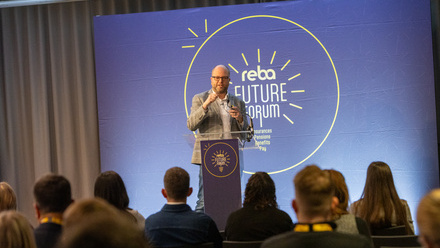Dave Roberts of Virgin Media on developing strong relationships with benefits providers

It was an issue raised during REBA’s recent webinar on using risk benefits to underpin a strategy built on data and prevention. Dave Roberts, head of pensions, benefits and wellbeing at Virgin Media, highlighted that it is through these relationships that employers can get access to relevant, good quality data which can steer and influence wellbeing strategy.
Virgin Media’s wellbeing strategy has been in place for around four years and evolves around a model called Thrive. It focuses on ‘being your best self’ and is broken into four segments – mental, physical, financial and social wellbeing. The last of these is highly integrated with its inclusion strategy and agenda.
“The whole [wellbeing strategy] has developed through conversations with insurers and suppliers. We make sure that we use the data that they feed to us on a regular basis to help build an understanding of where our challenges are, and not just rely on things like absence data for example, which can be a bit misleading,” he says.
Data from insurers and healthcare providers can help employers to identify ‘crunch points’ in employee wellbeing that required more focused action. In particular, Roberts says, health assessments can offer a valuable overview of the health of the workforce.
“The sort of data that these provide can be really interesting when having conversations with insurers. If the data shows that there are particular positive trends in certain areas, that may encourage insurers to look at things differently when they’re underwriting,” says Roberts.
Insurance is all about risk, and if the employer is able to demonstrate that they’re taking mitigating actions through other wellbeing benefits and initiatives, Roberts believes insurers should take this into account.
“Some insurers do ask about that and some actively support these things by helping you to develop solutions, whereas others…are only interested in data and statistics. So that’s when it becomes quite important to prove that what you’re doing is having positive actions,” he adds.
One issue, however, is that some mitigating actions that employers take may not have a positive consequence for several years, making it difficult to evidence their impact. This is where the importance of good relationships with insurance providers and brokers can come to the fore.
“There’s got to be a faith dynamic in there. Insurers have to believe that the actions you’re taking will have a consequence; but having those conversations means that the insurers that you work with have to be quite proactive and dynamic in the way that they think about things,” concludes Roberts.
Having positive relationships with providers and benefits partners enables employers to get the best value from their benefits. It allows providers to better understand your business and its needs, through providing the right data for your organisation. Providers can also develop a better appreciation of your wider wellbeing initiatives, and consider whether these should have a positive impact on future premiums.
For more on this topic, watch the full webinar on how to create a robust wellbeing plan – using risk benefits to underpin a strategy built on data and prevention.
The author is Dawn Lewis, content editor at REBA.






